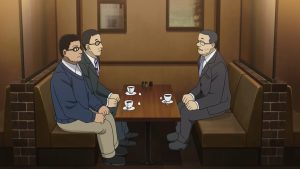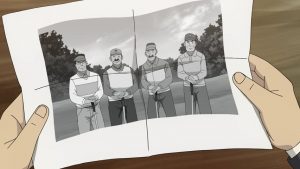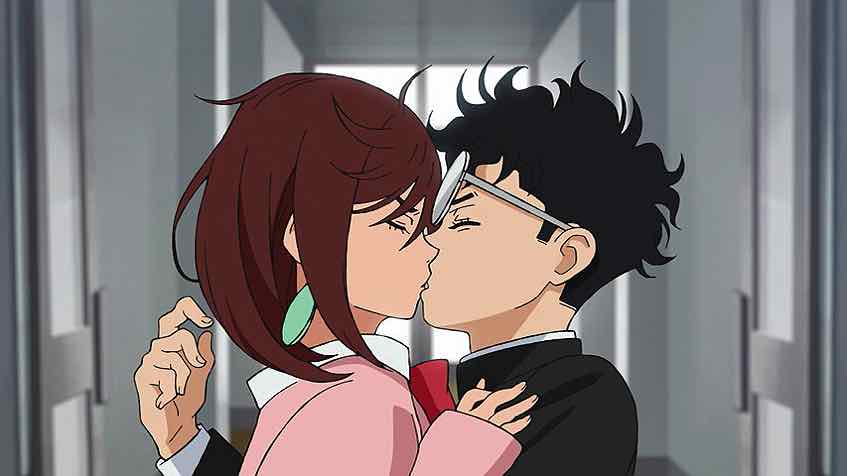One thing I’m noticing about Gurazeni is that it seems to be less about baseball lately than it ever was. That’s fine, because the series was always about the lifestyle of professional baseball as much (or likely more) than the sport itself. But it does set up a sort of interesting vibe, where the sport loses some of its significance to the story. In a sense the series is going all-in on its chosen persona, which is as unconventional for a sports series as its Saturday compatriot, Hinomaru Zumou, is conventional.
 The saga of Toku-chan took several turns this week, all of which were interesting but none of which were especially unexpected. Naturally it was left to Matsumoto-san (and Bonda) to break the news to him when he and his fiancee got home from Guam, but Matsumoto has managed to secure Toku an offer as a coach for the Fukui Dynamite, an independent league team. Under the circumstances it’s a generous gesture, although independent leagues are the purgatory of professional baseball. But for a guy like Toku-san what the world outside of baseball altogether have to offer?
The saga of Toku-chan took several turns this week, all of which were interesting but none of which were especially unexpected. Naturally it was left to Matsumoto-san (and Bonda) to break the news to him when he and his fiancee got home from Guam, but Matsumoto has managed to secure Toku an offer as a coach for the Fukui Dynamite, an independent league team. Under the circumstances it’s a generous gesture, although independent leagues are the purgatory of professional baseball. But for a guy like Toku-san what the world outside of baseball altogether have to offer?
 I wasn’t surprised to hear the value of the Fukui offer – about 300,000 Yen (maybe $2700) per month – though it was mildly shocking to know that was actually more than he was making as a color man for the Spiders. It’s another reminder that pro baseball in Japan is far from glamorous for all but the stars. And as Akemi points out, that kind of salary is a lot easier to live on in Fukui than Tokyo. Toku agonizes over the decision for a bit, but there can only be one choice – he’s a baseball man, and if he wants to stay involved in the game he has to take this lifeline offered to him, no matter how unglamorous.
I wasn’t surprised to hear the value of the Fukui offer – about 300,000 Yen (maybe $2700) per month – though it was mildly shocking to know that was actually more than he was making as a color man for the Spiders. It’s another reminder that pro baseball in Japan is far from glamorous for all but the stars. And as Akemi points out, that kind of salary is a lot easier to live on in Fukui than Tokyo. Toku agonizes over the decision for a bit, but there can only be one choice – he’s a baseball man, and if he wants to stay involved in the game he has to take this lifeline offered to him, no matter how unglamorous.
 The real suspense here is not whether Toku will take the offer, but whether Akemi will agree to go along with him to Fukui. She does, much to his surprise – one might say that his lack of faith in her is a bit disappointing. In fact, when circumstances conspire to get him back to his old job, Toku is clearly a bit disappointed because this means Akemi is likely to keep her old job (as a hostess in Roppongi). This all comes down because Jinno winds up getting an offer to manage the Mops (read Yomuri Giants, the Yankees of Japan) when his old pal gets axed over a 10-year old story about his being involved as a spokesman for a real estate company with yakuza ties.
The real suspense here is not whether Toku will take the offer, but whether Akemi will agree to go along with him to Fukui. She does, much to his surprise – one might say that his lack of faith in her is a bit disappointing. In fact, when circumstances conspire to get him back to his old job, Toku is clearly a bit disappointed because this means Akemi is likely to keep her old job (as a hostess in Roppongi). This all comes down because Jinno winds up getting an offer to manage the Mops (read Yomuri Giants, the Yankees of Japan) when his old pal gets axed over a 10-year old story about his being involved as a spokesman for a real estate company with yakuza ties.
 All this is, in a sense, the buildup to the big event of the season – and again it’s not an on-field one. Natsunosuke’s annual contract negotiations are coming up, and given the themes of Gurazeni that’s obviously a monumental event. What does that hold for him – will his contributions early and late lead to a substantial increase, or will he be docked for having missed half the season? It should be interesting to see how these negotiations play out – obviously things are much different than in MLB, where high-powered agents are at the center of the bargaining and even LOOGY and utility infielders comfortably earn seven figures (American) if they’re any good.
All this is, in a sense, the buildup to the big event of the season – and again it’s not an on-field one. Natsunosuke’s annual contract negotiations are coming up, and given the themes of Gurazeni that’s obviously a monumental event. What does that hold for him – will his contributions early and late lead to a substantial increase, or will he be docked for having missed half the season? It should be interesting to see how these negotiations play out – obviously things are much different than in MLB, where high-powered agents are at the center of the bargaining and even LOOGY and utility infielders comfortably earn seven figures (American) if they’re any good.


























